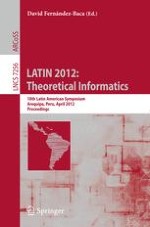2012 | OriginalPaper | Chapter
Cache Me If You Can: Capacitated Selfish Replication Games
Authors : Ragavendran Gopalakrishnan, Dimitrios Kanoulas, Naga Naresh Karuturi, C. Pandu Rangan, Rajmohan Rajaraman, Ravi Sundaram
Published in: LATIN 2012: Theoretical Informatics
Publisher: Springer Berlin Heidelberg
Activate our intelligent search to find suitable subject content or patents.
Select sections of text to find matching patents with Artificial Intelligence. powered by
Select sections of text to find additional relevant content using AI-assisted search. powered by
Motivated by peer-to-peer (P2P) networks and content delivery applications, we study Capacitated Selfish Replication (CSR) games, which involve nodes on a network making strategic choices regarding the content to replicate in their caches. Selfish replication games were introduced in [6], who analyzed the uncapacitated case leaving the capacitated version as an open direction.
In this work, we study pure Nash equilibria of CSR games with an emphasis on hierarchical networks, which have been extensively used to model communication costs of content delivery and P2P systems. The best result from previous work on CSR games for hierarchical networks [19,23] is the existence of a Nash equilibrium for a (slight generalization of a) 1-level hierarchy when the utility function is based on the sum of the costs of accessing the replicated objects in the network. Our main result is an exact polynomial-time algorithm for finding a Nash Equilibrium in any hierarchical network using a new technique which we term “fictional players”.We show that this technique extends to a general framework of natural preference orders, orders that are entirely arbitrary except for two constraints - “Nearer is better” and “Independence of irrelevant alternatives”. This axiomatic treatment captures a vast class of utility functions and even allows for nodes to simultaneously have utility functions of completely different functional forms.
Using our axiomatic framework, we next study CSR games on arbitrary networks and delineate the boundary between intractability and effective computability in terms of the network structure, object preferences, and number of objects. In addition to hierarchical networks, we show the existence of equilibria for general undirected networks when either object preferences are binary or there are two objects. For general CSR games, however, we show that it is NP-hard to determine whether equilibria exist. We also show that the existence of equilibria in strongly connected networks with two objects and binary object preferences can be solved in polynomial time via a reduction to the well-studied evencycle problem.
